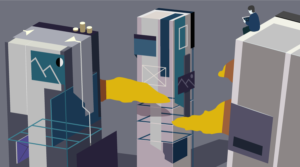You know the directive:
make great apps that users love.
And what’s the sign that a user loves your app? They use it frequently. Frequent relations with your app are a sign of commitment, and commitment is a sign of love. But how does this scale?
As it turns out, a recent report has found that a third of British children are not able to achieve a good balance between screen time and their other activities. Elsewhere in the world, “smartphone rehab” centres (yes, really) are opening up to offer recovery programs for people whose use of electronic devices is excessive. In other, cruder, words, they are smartphone addicts.
A smartphone dependency might not be as flagrant as you’d think. It’s a dependency when it prevents you from adequately engaging in other activities. Consider the simple activity of having a dinner with friends or family. If you see a smartphone placed on top of the dinner table, with attention automatically diverted to it whenever its screen periodically flashes up, then its owner is not fully engaging with the rest of the diners. They are in two places at the same time.
Look what you’ve done. You’ve made a “great app that a user loves” to the point of being addicted to it.
I won’t go as far as saying that you, the developer, are to be held morally responsible for this unfortunate turn of events. I believe consumers are responsible for regulating their own consumption of goods (as long as the goods sold were not designed to generate a physical addiction, which is not the case for apps).
If you were a bar, you wouldn’t serve alcohol to a drunk consumer who’s about to pass out due to excess drinking. Yet if you were a restaurant, you wouldn’t object to serving the most fattening food to obese customers, should they request it. Are apps more similar to bars or to restaurants in this context? Should you time a user’s usage of your app and restrict access to it when you detect binging?
I believe this is a problem to be solved mainly at the OS level, the OS should take appropriate measures to mitigate a user’s predisposition towards psychological addiction to a specific app or set of apps.
Do you think there are steps you can take too, as an app developer? Let us know in the comments below.
References and further reading
Ariel is the former editor of SitePoint's Mobile Channel. He worked on more than 10 different apps currently available on the App Store, and plans to release many more. He loves writing, mobile devices, hackathons, and blockchains.





